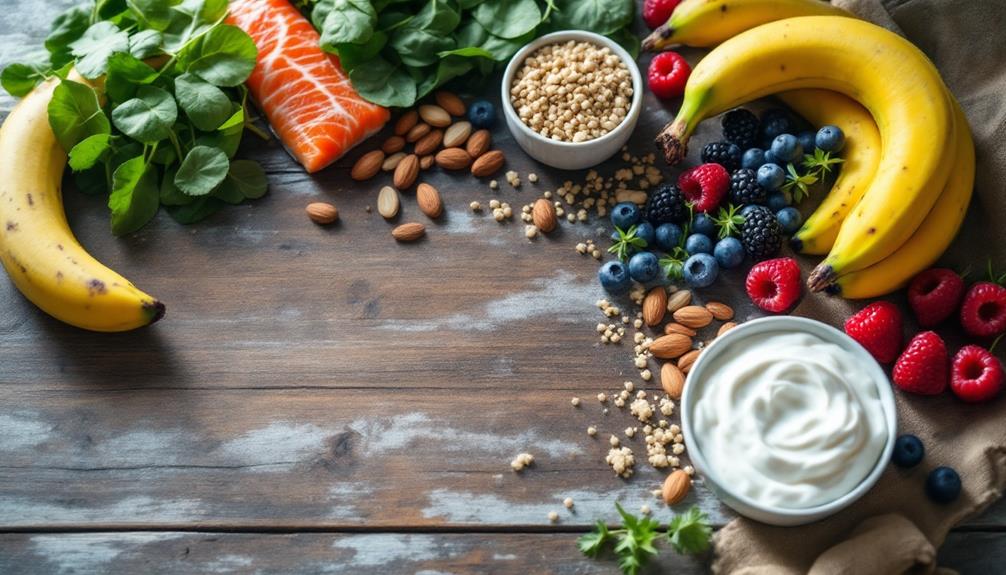To enhance your muscle recovery, focus on these top seven foods. First, Greek yogurt offers protein and probiotics. Quinoa serves as a complete protein base rich in fiber. Salmon, loaded with omega-3s, reduces inflammation and aids repair. Spinach is packed with antioxidants and magnesium for healing. Sweet potatoes replenish energy with healthy carbs, while berries combat inflammation and keep you hydrated. Finally, eggs provide essential amino acids and vitamins for overall health. Incorporating these foods into your diet can support faster recovery and better performance. Find out how to easily include them in your meals!
Core Insight
- Greek yogurt provides high protein and probiotics, aiding muscle repair and gut health for optimal recovery.
- Quinoa is a complete protein source packed with fiber, helping with digestion and keeping you satisfied post-workout.
- Salmon's omega-3 fatty acids reduce inflammation and support faster recovery while providing essential protein for muscle repair.
- Spinach is rich in antioxidants and vitamins that promote healing and muscle function, making it an excellent addition to recovery meals.
- Berries are nutrient-dense and hydrating, offering antioxidants that combat inflammation and muscle soreness after intense exercise.
Greek Yogurt
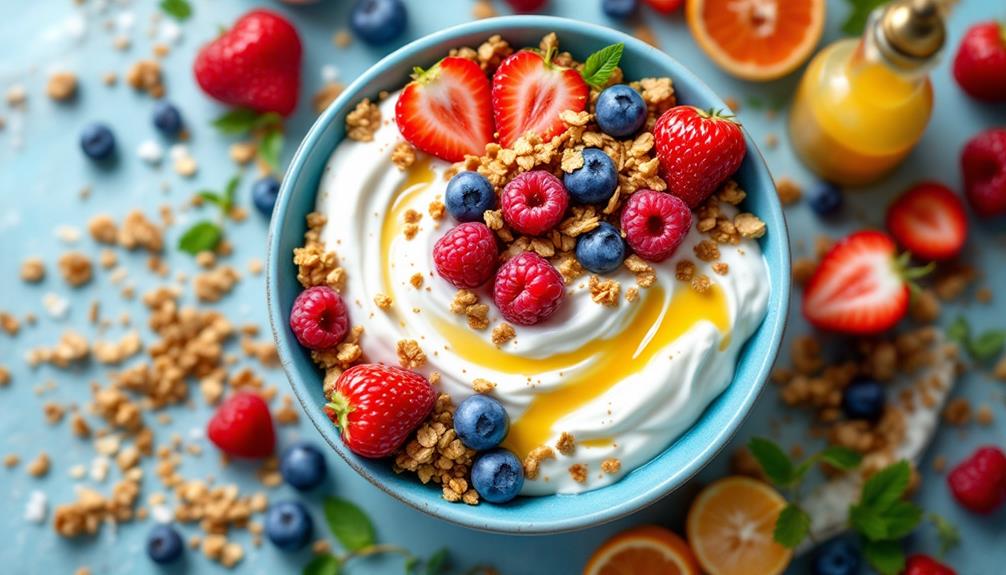
Greek yogurt is a great option for muscle recovery. Its creamy texture and rich nutrients make it a favorite among athletes. It's high in protein, which helps repair and build muscle tissue. Eating it after your workout can help you recover faster and feel less sore. Greek yogurt also has vitamin D3, which supports both muscle and immune health.
In addition, Greek yogurt contains probiotics that promote gut health. A healthy gut means better nutrient absorption, which can improve your overall performance.
You can easily add Greek yogurt to your diet. Try mixing it with fruits, nuts, or honey for extra flavor and nutrients.
Whether you have it as a snack or as part of a meal, Greek yogurt is versatile and tasty. It's a simple way to help your recovery while enjoying something delicious.
Quinoa
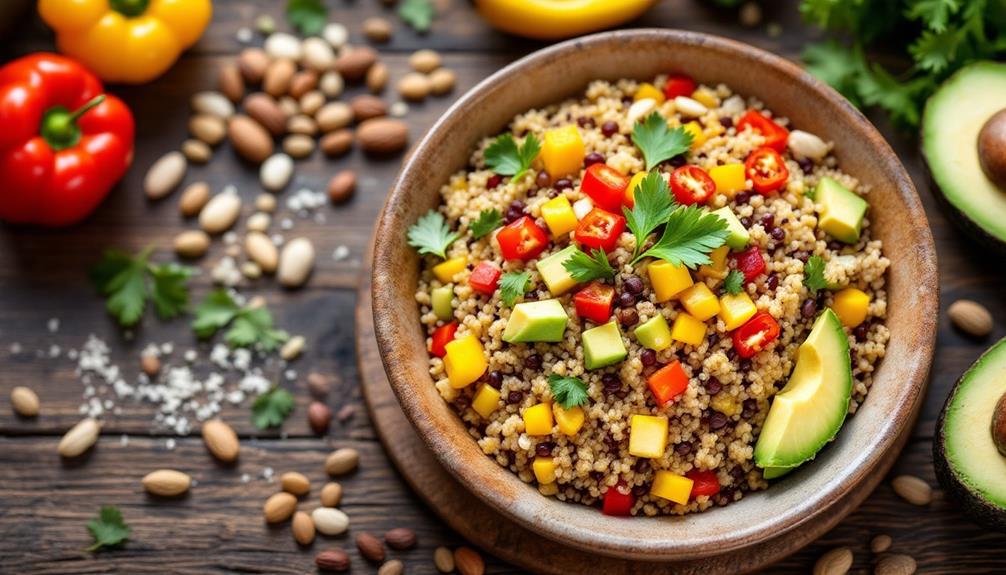
Quinoa is a great grain for muscle recovery. It is full of essential amino acids, making it a complete source of protein. After you work out, your muscles need these nutrients to heal and grow stronger. Quinoa is also high in fiber, which helps with digestion and keeps you feeling full and energized. Additionally, it contains nitrates that may help improve blood flow, which can enhance your exercise performance and recovery.
Besides protein, quinoa is rich in vitamins and minerals like magnesium and iron, which are important for your overall health. You can easily add quinoa to your meals. It works well as a base for salads, stir-fries, or even as a breakfast dish with fruits and nuts.
Salmon
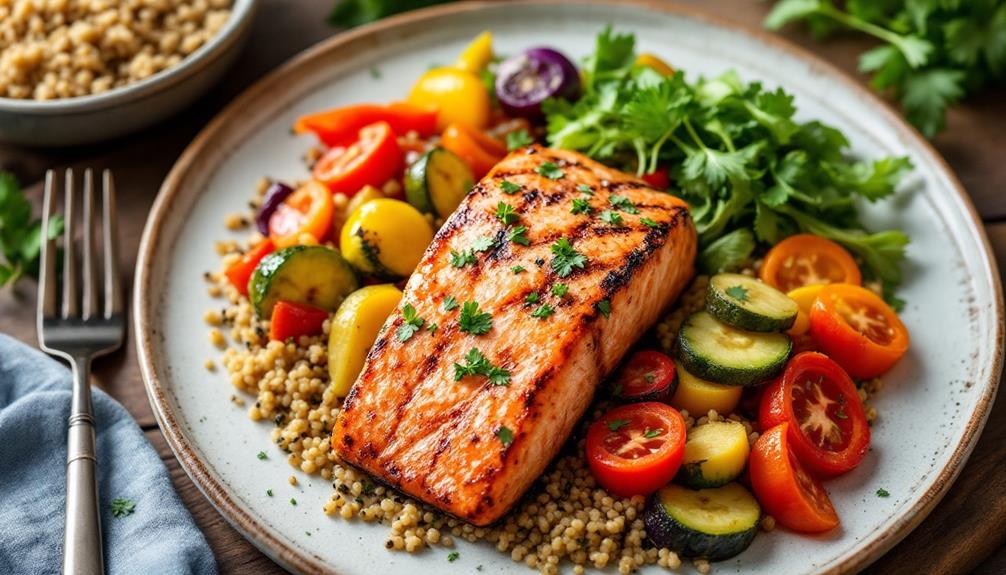
Salmon is a great food for recovering muscles. It is high in omega-3 fatty acids, which can help reduce inflammation and speed up healing after intense workouts. Salmon is also packed with protein, which is important for repairing and building muscles.
Here's a quick look at the nutrition in salmon:
| Nutrient | Amount per 3.5 oz | Benefits |
|---|---|---|
| Protein | 25 grams | Helps repair muscles |
| Omega-3s | 2.2 grams | Reduces inflammation |
| Vitamin D | 570 IU | Helps absorb calcium |
Adding salmon to your meals can help you feel better and recover faster. Whether you grill it, bake it, or toss it in a salad, it's a tasty way to nourish your body.
Spinach
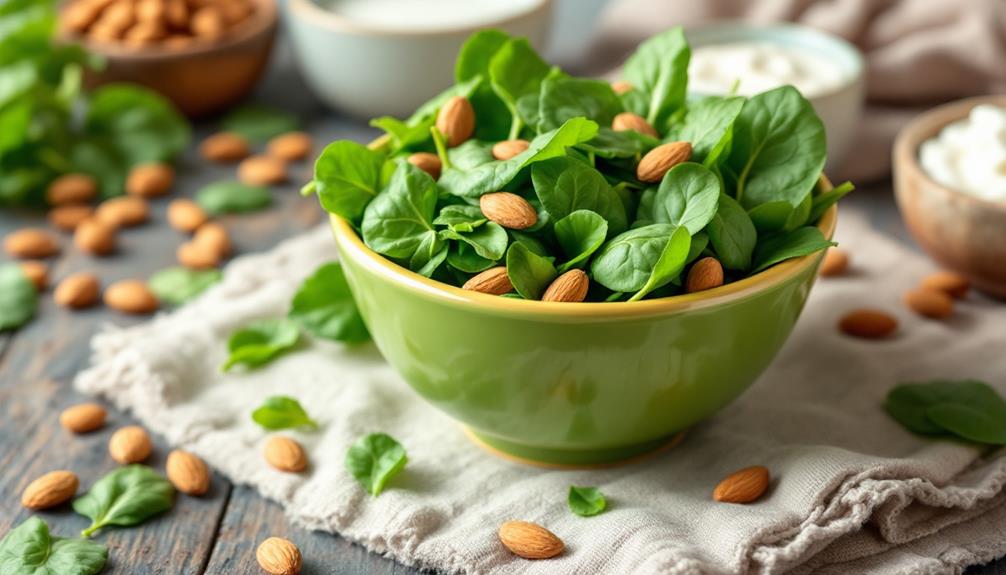
Adding spinach to your post-workout meals can really help your muscles recover. This leafy green is full of important nutrients that reduce inflammation and promote healing. Spinach has antioxidants, like vitamins A, C, and K, which fight oxidative stress that happens after tough workouts.
You can also use herbal supplements to boost the benefits of spinach, helping with muscle recovery and easing soreness. Combining healthy foods with targeted supplements can improve how well your body recovers after exercise.
Spinach is also high in magnesium, which is essential for muscle function and recovery. By including spinach in your meals, you not only enhance the flavor but also increase your intake of important nutrients.
You can easily add fresh spinach to smoothies, salads, or omelets. You can also steam or sauté it as a side dish. No matter how you choose to enjoy it, including spinach in your diet will support your recovery and help you get back to training stronger.
Sweet Potatoes

Sweet potatoes are a great choice for your post-workout meals. They provide carbohydrates that help replenish energy and support muscle recovery. Packed with vitamins A and C, sweet potatoes also boost your immune system, which is important after intense workouts. Many athletes like to pair sweet potatoes with coconut water for hydration after exercise.
These colorful tubers have antioxidants that can help reduce inflammation, aiding your recovery. You can enjoy sweet potatoes in various ways: baked, mashed, or as fries.
To make a balanced meal, pair sweet potatoes with a protein source like chicken or beans. Their high fiber content will keep you feeling full, which is helpful for overall nutrition and weight management. Make sweet potatoes a regular part of your recovery routine!
Berries
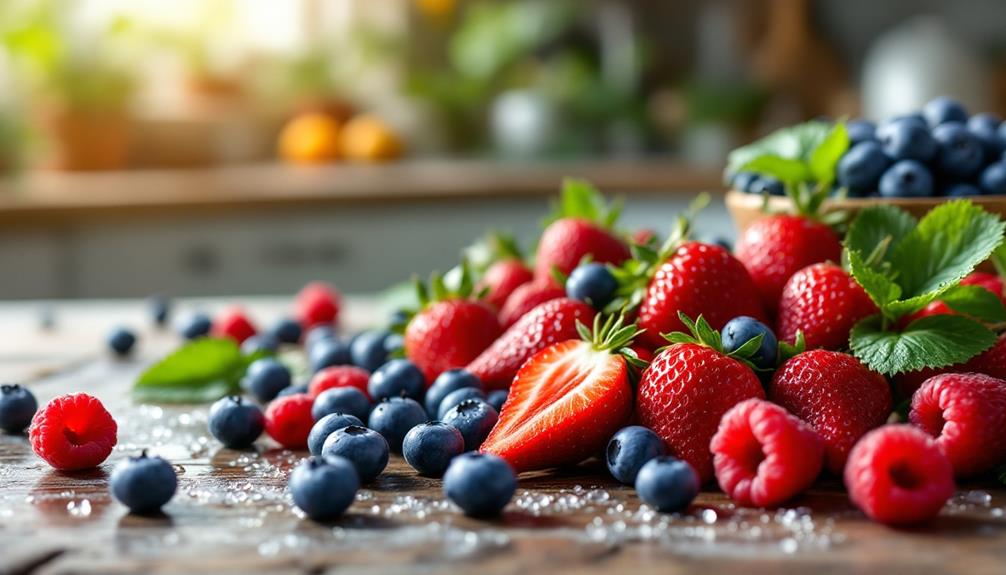
- Packed with Antioxidants: Berries help fight off harmful free radicals that your body produces during exercise. They also boost nitric oxide levels, which improves blood flow and aids in muscle recovery.
- Reduces Inflammation: Berries can help ease muscle soreness after workouts.
- Keeps You Hydrated: With their high water content, berries are great for staying hydrated, which is important for recovery.
- Nutrient-Dense: They are low in calories but rich in vitamins, minerals, and fiber.
Adding a variety of berries to your meals or snacks is a simple and tasty way to help with your recovery.
Eggs
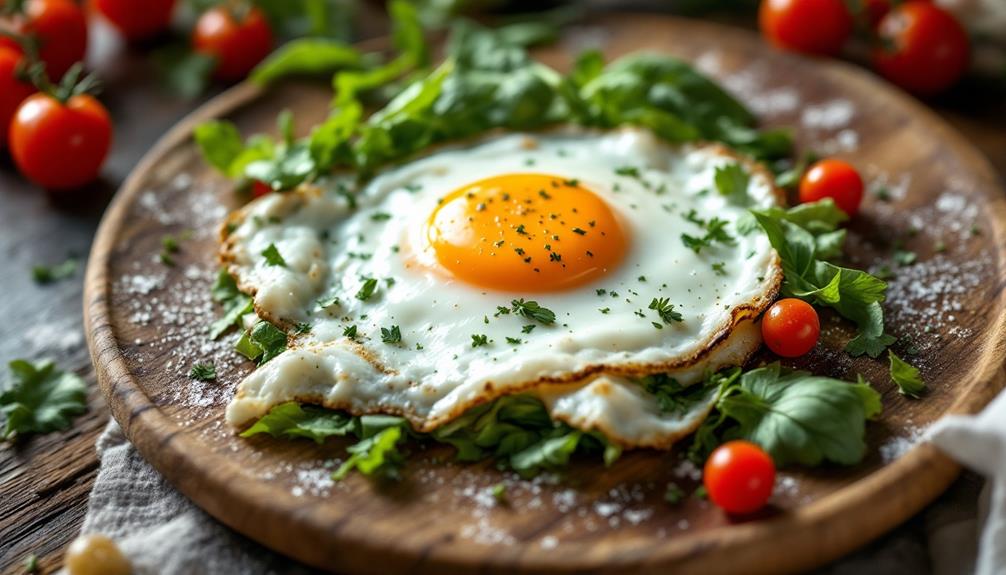
Eggs are a great source of protein, making them a smart choice for muscle recovery. They have all nine essential amino acids, which help repair muscle tissue. Eating eggs after a workout gives your body the nutrients it needs to recover. Like whey protein powders, eggs provide a complete protein profile, which is important for muscle repair and growth. They contain about 24-25 grams of protein, similar to popular whey supplements.
Besides protein, eggs are packed with vitamins and minerals. They provide vitamin D for bone health and B vitamins that help with energy production. Adding eggs to your post-workout meal can improve your recovery.
You can prepare eggs in many ways: scrambled, boiled, or as an omelet. Pair them with vegetables or whole grains for a balanced meal. Including eggs in your diet can really help boost your recovery efforts.
Frequently Asked Questions
How Often Should I Consume These Recovery Foods?
You should consume recovery foods regularly, ideally after workouts and as part of your daily meals. Aim for a balanced intake throughout the week to support consistent muscle repair and overall recovery.
Are There Any Food Allergies to Consider With These Options?
You should definitely consider potential food allergies when choosing recovery foods. Common allergens include dairy, nuts, and gluten. Always check labels and consult with a healthcare professional to guarantee you're making safe choices for your recovery.
Can I Substitute These Foods With Other Alternatives?
You can definitely substitute these foods with other alternatives. Just make sure they provide similar nutrients and benefits. Focus on whole foods rich in protein, healthy fats, and carbohydrates to support your muscle recovery effectively.
What Is the Best Time to Eat Recovery Foods?
Eating recovery foods within 30 minutes post-workout boosts muscle repair by up to 50%. You should prioritize this timing to maximize recovery. Your muscles'll absorb nutrients more efficiently, helping you feel ready for your next workout.
How Do These Foods Compare to Protein Supplements?
When you compare whole foods to protein supplements, whole foods provide additional nutrients and fiber that supplements often lack. They can enhance recovery more holistically, while supplements offer convenience and quick protein intake when needed.

